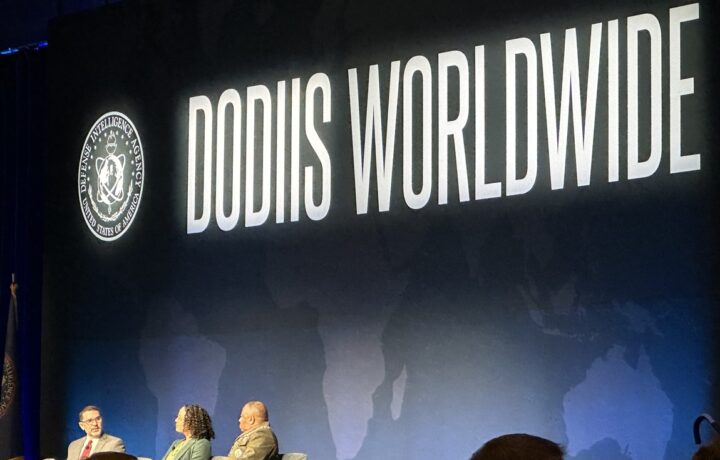In an era of swift technological evolution, complex geopolitical landscapes, and emerging threats, national security requires more than a reactive approach; it demands proactive, collaborative, and forward-thinking strategies, with strong governance to put the right guardrails around quickly evolving technologies like AI. That was a key theme in a fireside chat that helped kick off day one of DoDIIS Worldwide, the yearly gathering of defense intelligence experts. Principal Deputy Director of National Intelligence Dr. Stacey Dixon and Lt. Gen. Dimitri Henry, director of intelligence at the Join Staff (J2) underscored the need for a shift in mindset, emphasizing governance, risk management, and integrative relationships.
Governance: The Backbone of Effective Security
Gen. Henry noted the paradox in people’s attitudes toward governance: “Everybody seems to want governance until you actually give it to them.” Often, it takes a crisis to highlight the need for boundaries and accountability. However, governance is more than simply setting boundaries—it is a structured way of addressing and adapting to threats, especially when it comes to emerging fields like AI. A robust governance model is indispensable in directing AI responsibly and aligning it with strategic national security goals.
For instance, “causal AI,” as mentioned by Henry, aims to aid decision-makers by providing a clear understanding of actions and their consequences. Yet, as Dixon points out, this requires establishing standards for AI implementation. The challenge is finding the balance between rapid technological progress and intentional, thoughtful governance. This approach is not only about risk avoidance but also about defining the values and outcomes AI should support in national security contexts.
Risk as a Strategic Mindset
Henry stresses the need to view risk as a mindset rather than just a metric. Current security frameworks tend to focus on immediate risks rather than looking at how these risks might evolve. “We’re thinking about now, instead of the future,” he observed. This narrow focus can limit security efforts and prevent institutions from preparing for what lies ahead. Instead, forward-thinking risk management should balance present realities with a readiness for future challenges.
Dixon highlights that younger hires entering national security and intelligence agencies tend to be more comfortable with risk and have experience with advanced technologies. These professionals bring new perspectives and a readiness to adapt, which can drive agencies toward proactive strategies rather than reactive responses. By fostering a culture that embraces calculated risk, security agencies can encourage innovation and responsiveness, making them more adaptable to new threats.
Bridging Expertise Gaps and Expanding Networks
One of the pressing issues Dixon identifies is the gap in expertise available within governmental agencies, particularly in areas like financial security, international finance regulations, and biosecurity. Dixon notes that “the talent we need won’t necessarily move into government,” so creating a framework that connects to external experts—whether in academia, industry, or non-governmental organizations—becomes crucial.
For example, biosecurity has gained attention after the pandemic, with concerns that adversaries may explore biological threats. With limited in-house expertise, agencies must seek partnerships across sectors to build a more comprehensive understanding of such risks. Dixon emphasizes the importance of not only accessing this external knowledge but also integrating it seamlessly into security frameworks. By developing partnerships with varied sectors, agencies gain diverse insights that can lead to more agile and effective responses to threats.
Building Well-Rounded, Critical Thinkers
The need for critical thinking skills and curiosity is paramount in the security landscape, as Henry articulates: “Curiosity, that ability to think about why, or what, and why not, more importantly.” Security personnel must possess not only technical know-how but also the ability to question established assumptions, analyze scenarios critically, and anticipate potential adversarial strategies.
Dixon advises cross-training and continuous learning, urging professionals to “cross-train yourself in other places” to ensure they are well-rounded and adaptive. This emphasis on versatility prepares personnel to respond to multifaceted threats and adapt to evolving security landscapes. Forward-thinking professionals with diverse skill sets will be critical as technology, geopolitical forces, and societal structures change rapidly.
Collaboration as the Core of Strategic Security
At the heart of this forward-looking approach is collaboration. Henry notes that “collaboration is what’s going to make you more relevant going forward.” Building collaborative frameworks that include internal teams and external partners enhances adaptability and ensures that national security is not isolated but a shared responsibility across allied nations, government sectors, and private organizations.
According to Henry, the Defense Intelligence Enterprise is still in its nascent stages. “It’s still a small ‘e,’ not a capital ‘E.’” To fully leverage the enterprise, the focus must be on developing strong, interoperable relationships that capitalize on the strengths of different entities. With robust partnerships in place, response times improve, and information flows freely, allowing for swift, coordinated actions that address shared security goals.
Interoperability: A Necessity for Modern Defense
As systems become more complex and technologically integrated, Henry emphasizes the need for interoperable systems that “can talk” to each other, enhancing the Defense Intelligence Enterprise. Building isolated systems is challenging enough, but creating interoperable, networked systems that connect people, data, and technology across national and allied boundaries takes intentionality and strategic investment. Such systems allow for real-time data sharing and quicker decision-making, critical in national security operations.
The interoperability mindset extends beyond systems to include the human dimension. Ensuring that people across agencies, departments, and international partners can collaborate without friction is essential. Henry sees this as a crucial part of a forward-thinking strategy that addresses not only current needs but also anticipates future challenges.




